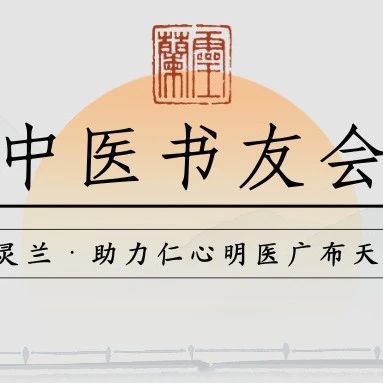
Chinese Medicine Book Club Issue 2016
One issue daily, accompanying the growth of TCM practitioners
I Introduction: “Medicine is the physician’s right hand, the weapon upon which they rely to treat illness. Only by deeply and accurately understanding the properties of each herb can one use them with mastery.” The saying goes, “When will the heart forget itself? The technique can be misapplied at any time.” Caution is essential. (Editor/Wang Chao)

Personal Experiences with Traditional Chinese Medicine
Author/Wu Shengxiong
In clinical practice, when treating certain diseases with specific herbs, some doctors advocate for high doses, saying, “A loud drum requires a heavy hammer”; while others suggest low doses, stating, “Four taels can move a thousand pounds.” Some say certain herbs are as fierce as wolves; others argue that they can be gentle as sheep. For example, both Chuan Wu (Chuanwu) and Cao Wu (Caowu) are used with great caution, especially the raw forms, which can instill fear. Zhang Shu is an expert in using Chuan Wu and has a lifelong affection for it, particularly the raw forms, having used them for decades without incident. In August 2010, he prescribed a formula containing raw Chuan Wu and Cao Wu for a patient, who after consuming it, experienced complete numbness below the neck, which terrified Zhang Shu and ended his use of these herbs.
Medicine is the physician’s right hand, the weapon upon which they rely to treat illness. Only by deeply and accurately understanding the properties of each herb can one use them with mastery. Given this, I embarked on a long journey of tasting and testing herbs.
Many magazines report that high doses of Xi Xin (Asarum) are effective for various pain conditions. Influenced by the saying, “The dosage of Xi Xin is not a trivial matter,” I tried 6 grams of authentic Liao Bei Xi Xin, using only the pure root (excluding inferior products), and found it extremely numbing and difficult to swallow. After preparing 10 grams, the aroma wafting from the bowl made me feel suffocated.
A renowned physician from Sichuan suggested that crushed Xin Yi Hua (Magnolia Flower) taken after roasting is effective for treating rhinitis. Following his method, I spent half a day preparing the medicine, and after swallowing a small packet myself, I immediately felt a tingling sensation from my throat down to my chest, followed by shortness of breath, dizziness, nausea, and dry heaving. My vision blurred, and realizing something was wrong, I quickly used chopsticks to forcefully expel the medicine I had swallowed, feeling extremely uncomfortable.
One day, experiencing “dry heaving, headache, and salivation,” I decided to try Wu Zhu Yu Tang (Evodia Decoction). I used 10 grams of Wu Zhu Yu, barely managed to drink two sips, and discarded the rest, vowing never to drink Wu Zhu Yu Tang again.
After catching a cold with wind and cold symptoms, I took Ma Huang Tang (Ephedra Decoction), using 10 grams of Ma Huang, but felt no effect, so I doubled the dose to 20 grams, which resulted in palpitations.
In clinical practice, many conditions require the use of Fu Zi (Aconite). To better master this herb, I began experimenting with Fu Zi Tang, trying 10, 20, 30, and 40 grams, but felt no warmth or heat. I thought Fu Zi needed Gan Jiang (Dried Ginger) to generate heat, so I added 30 grams of Gan Jiang, yet still felt no effect. Alas! The quality of commercially available Fu Zi is too poor.
I have a formula that is excellent for treating various pain conditions. The Ma Qian Zi (Strychnos) in the formula loses efficacy if processed improperly, and if processed too lightly, it can cause reactions, which is very dangerous. Therefore, every time I prepare the medicine, I first test it myself. One night, after testing the medicine, within 15 minutes, I felt my brain empty, as if I were drunk, and my legs moved like a robot, slow and unresponsive; yet my consciousness remained clear. At 33 minutes, it felt like I was “walking on cotton,” floating in the air, followed by my hands becoming stiff and unresponsive; at 46 minutes, my neck became extremely stiff, and my spine felt like a hard stick, causing me to fall when I turned my head. I quickly drank three large glasses of cold water as an antidote, and it took three hours to gradually feel better.
Ju Ming Zi (Cassia Seed): clears the liver, brightens the eyes, lowers lipids and blood pressure, detoxifies, beautifies, and promotes bowel movements. I prepared a powder to brew as tea, but found it difficult to swallow myself; how could I give it to patients?
Shan Zha Wan (Hawthorn Pill) is my favorite; whenever I feel bloated after a meal, taking one quickly resolves the issue.
Once, after taking one and feeling no relief, I took another, still with no effect, and ended up taking 20, which caused my stomach to gurgle for two days, leading to great discomfort.
A senior brother gave me a nasal drop formula, claiming it had remarkable effects for treating sinusitis. The formula roughly includes:
Goosefoot, Bing Pian (Borneol), Wild Chrysanthemum, Honeysuckle, Cang Er (Xanthium), Xin Yi Hua (Magnolia Flower), and Yi Yi Ren (Job’s Tears), concentrated and mixed with an appropriate amount of white liquor. After preparing it, I tried a drop, which made my nose sting painfully, and I decided not to use it on patients.
My journey of testing herbs continues, with myself, family, and friends participating. The highest martial arts skill among wandering heroes is “the unity of man and sword”; what I aim for is “the unity of man and medicine,” steadfastly walking the “Wu’s path of medication!”
Recommended Reading:
Personal Experience with Chinese Medicine: New Discoveries on the Efficacy of Lai Fu Zi (Radish Seed)
People’s Daily: The toxicity of Chinese medicine does not equate to being poisonous
|
I Copyright Statement
I Submission Email [email protected] |


 Every like you give, I take seriously as a sign of appreciation.
Every like you give, I take seriously as a sign of appreciation.

